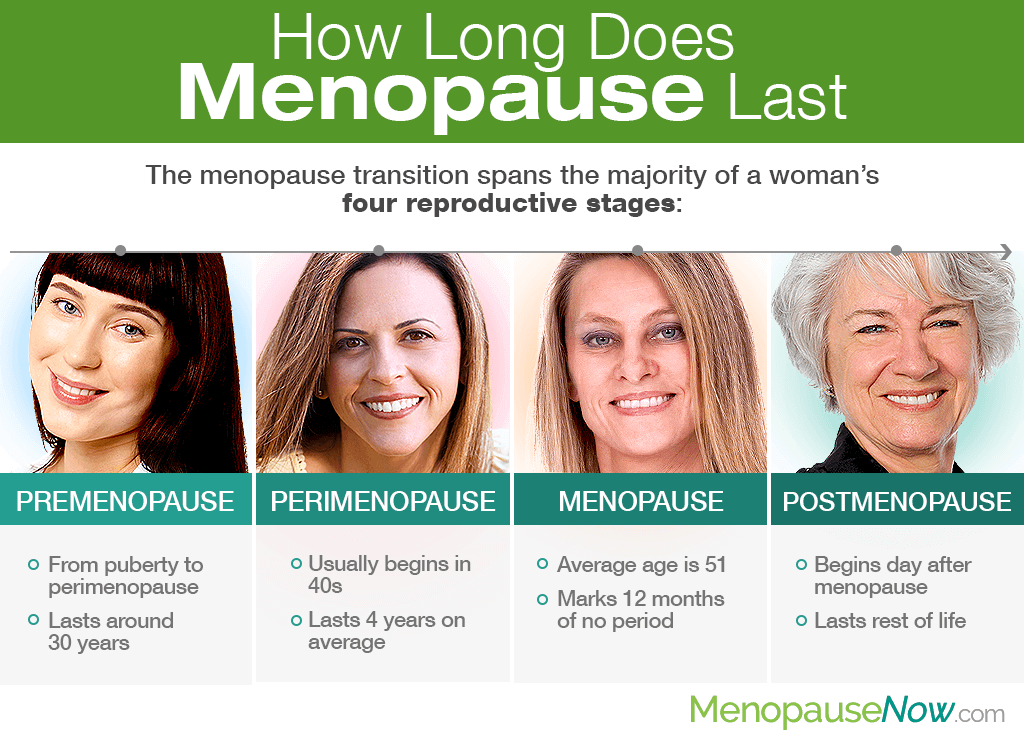Women who are about to end their fertile years may wonder exactly how long does perimenopause last? How long do they have to suffer from night sweats, hot flashes, mood swings, vaginal dryness, and other menopause symptoms before finally being done with it all?
Continue reading to learn how long does menopause last, starting with the stages of menopause and ending with tips on how find relief once and for all.
About Menopause
The menopause transition spans the majority of a woman's four reproductive stages:
Premenopause

Premenopause is the first stage in a woman's reproductive life that begins with puberty and ends with perimenopause. It is a time when a woman is most fertile.
Even though there are no menopause symptoms, she may experience occasional symptoms from hormonal fluctuations around the time of her period or ovulation.
Perimenopause

Perimenopause is the second menopausal stage that is colloquially referred to as menopause. Although usually announced with irregular periods, this is not always the case.
Perimenopause is a time characterized by drastic hormonal fluctuations of estrogen and progesterone as their main producer, the ovaries, begins to wind down reproductive functions.
As such, menopause symptoms occur from the hormonal imbalance. They include hot flashes, night sweats, mood swings irritability, low libido, irregular periods, joint pain, vaginal dryness, difficulty concentrating, and many more.
Menopause

Menopause is a date in time that marks when a woman has gone 12 consecutive months without a period.
The average age of menopause in the United States is 51. However, a woman may enter menopause sooner such as in the cases of early menopause or surgical menopause.
Postmenopause

After menopause is declared, a woman is officially in postmenopause and will remain so for as long as she lives.
Although menopause symptoms do tend to wane in this period, women should be wary of other health complications that could develop in lieu of a hormone deficiency, such as osteoporosis, heart disease, dyspareunia, and more.
So, How Long Does Menopause Last?
Perimenopause symptoms last for four years on average. For some women, they last for only a few months, while for others, over a decade.
A good indicator of how many years does menopause last is to ask one's mother. A woman often goes through perimenopause at around the same age as her.
Also, as aforementioned, the severity of perimenopause symptoms generally decreases, but this is not always the case. For instance, in most women, vasomotor symptoms - like hot flashes - can last for two years after menopause, but in other, they may continue for up to 10 years or more.
How Can I Find Relief from Menopause Symptoms?
Management techniques for menopause symptoms vary. For beginners, here are some tips for specific symptoms:
Hot flashes
- Dress in layers so you can remove them when you feel a hot flash coming on.
- Always have a portable fan with you.
- Eliminate triggers from your diet, such as caffeine or spicy foods.
Night sweats
- Keep your bedroom cool.
- Place a glass of water on your bedside table.
- Use bed sheets for night sweats, such as those made from moisture-wicking material.
Vaginal dryness
- Use natural lubricants, such as olive oil or coconut oil.
- Only wear cotton underwear; synthetic materials can aggravate the symptom.
- Do not douche as this kills good bacteria.
Mood swings
- Take slow, deep breaths as you withdraw from a stimulating situation.
- Avoid over consuming simple sugars as they will provoke energy highs followed by crashes.
- Go for a stroll outdoors to clear your mind.
For other menopause symptoms, click on the previous link to check out each symptom's specific management suggestions.
How Can I Treat Menopause Symptoms?
While managing symptoms will stave them off short-term, long-lasting relief will only be found once women address the underlying cause of hormonal imbalance.
Menopause symptom treatments focus on promoting hormonal equilibrium within the body through lifestyle changes of an optimized diet, regular exercise, and healthy habits. Menopausal women are encouraged to consume ample amounts of phytoestrogenic foods, which contain plant-based estrogens, while participating in regular exercise of 150 minutes per week and partaking in wholesome habits to promote overall wellness.
For better results, menopausal women are encouraged to pair these techniques with alternative medicine of phytoestrogenic herbal supplements or hormone-regulating supplements.
Phytoestrogenic herbal supplements, including black cohosh and red clover, contain higher concentrations of phytoestrogens than foods, thus working more quickly and effectively in resolving an estrogen deficiency. However, because they introduce exogenous hormones into the body, they are not for long-term use.
On the other hand, hormone-regulating supplements - like Macafem - encourage the pituitary and thyroid glands to produce their own natural hormones, thus resolving a myriad of menopause symptoms caused by abnormal estrogen, progesterone, or even testosterone levels. Since they do not contain external hormones, they are safer to use for an extended period of time.
Sources
- American Academy of Family Physicians. (n.d.). Menopause. Retrieved April 30, 2019, from https://familydoctor.org/condition/menopause/
- Cleveland Clinic. (2019). Menopause, Perimenopause and Postmenopause. Retrieved April 30, 2019, from https://my.clevelandclinic.org/health/diseases/15224-menopause-perimenopause-and-postmenopause
- Dalal, P.K. & Agarwal, M. (2015). Postmenopausal syndrome. Indian Journal of Psychiatry, 57(Suppl 2), S222-S232. doi: 10.4103/0019-5545.161483

